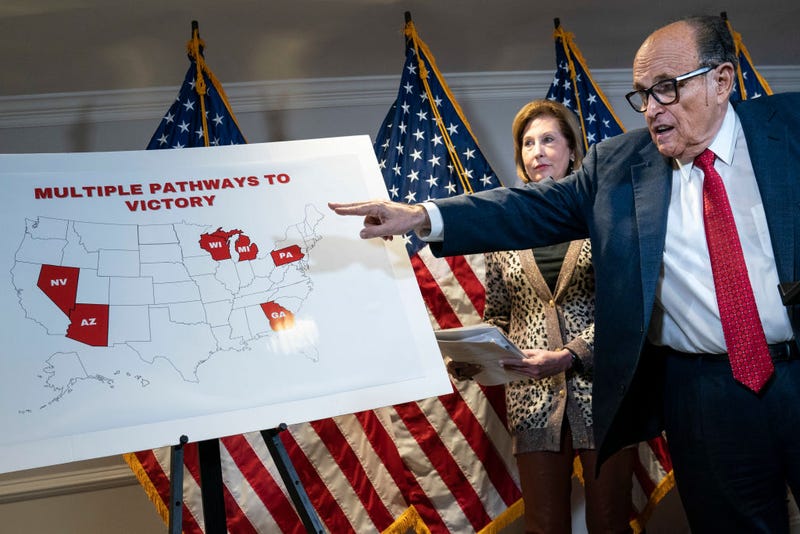
Even as Donald Trump and a team of lawyers associated with the former president publicly pushed claims of election fraud in late November, Trump’s campaign already knew the accusations were false.
According to a New York Times report, claims against Dominion – a company that manufactures voting machines – were debunked in an internal memo prepared by the campaign. This memo came to light through court papers filed last week as a motion in a defamation lawsuit filed by Eric Coomer, former director of product strategy and security for Dominion.
Coomer sued lawyers Sidney Powell and Rudy Giuliani as well as the Trump campaign and others for defamation last year in state district court in Denver. He has said that after the election, he was wrongly accused by right-wing podcast host Joe Oltmann, whose claims were amplified by the two lawyers.
Emails contained in the court documents show that Zach Parkinson, then the campaign’s deputy director of communications asked staff Nov.
13 to fact check matters concerning Dominion. By the next day, Parkinson received the memo, which contained news articles and public fact checking information.
Staffers concluded in the memo that Dominion did not use voting technology from the software company, Smartmatic, in the 2020 election, that Dominion had no direct ties to Venezuela or Soros and there was no evidence that Dominion’s leadership had connections to left-wing “antifa” activists.
“The memo produced by the Trump campaign shows that, at least internally, the Trump campaign found there was no evidence to support the conspiracy theories regarding Dominion,” said Coomer’s lawyers.
Despite the memo, Powell and Giuliani appeared together at a Nov. 19 news conference it the Republican National Committee’s headquarters to claim that Coomer was at a center of a plot prevent Trump from being elected. They also said software company Smartmatic, financier George Soros and the country of Venezuela were in on the conspiracy.
Powell, who also runs a nonprofit organization, referenced “a massive influence of communist money.”
It is unclear if Trump, Powell or Giuliani knew about or saw the memo. Powell and Giuliani did not respond to messages from The New York Times seeking comment on the documents. Representatives for Trump also did not respond to emails seeking comment.
Giuliani said in a deposition that he had not seen the memo before he gave his presentation in Washington, and he questioned the motives of those who had prepared it, according to court documents.
“They wanted Trump to lose because they could raise more money,” Mr. Giuliani was quoted as saying in the deposition.
Documents from the recent court filing suggest that the campaign sat on its findings about Dominion while Powell and others attacked the company and four federal lawsuits were filed accusing it of rigging the election.
Many disregarded the conspiracy claims when no evidence came to light. However, the narrative “quickly gained currency in the conservative media and endure nearly a year later,” said the New York Times.
Both Powell and Giuliani were “active” in the plan to challenge the election, which included 60 failed lawsuits across the country.
Eventually, Giuliani and Trump perused another conspiracy narrative that was not centered on Dominion but rather on getting legislatures to overturn the popular vote.
Trump has continued to bring up false claims of election fraud and both Powell and Giuliani have stuck by their claims.
A lawyer for Giuliani said in a court filing last month that at least some of his client’s claims of election fraud were “substantially true.”
Just three weeks ago, Powell told a reporter for the Australian Broadcasting Corporation that the 2020 election was “essentially a bloodless coup where they took over the presidency of the United States without a single shot being fired.”
Dominion has also brought a defamation suit against Mike Lindell, the chief executive of MyPillow, for amplifying false election claims, said the New York Times. Last month, a federal judge in Washington ruled that the cases could continue moving toward trial.


